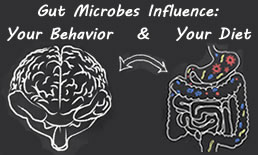Recent News & Events
Fruit Fly Study Finds That Gut Microbes Influence Food Choice and Behavior.
16
 In a study of fruit flies, neuroscientists found that the gut microbiome communicates with the brain and influences food choices. The microbiome is a community of bacteria that's present in all animals, including humans. Many studies have shown that microbes affect health and biological pathways such as appetite and immunity. However, researchers from the Champalimaud Centre for the Unknown in Portugal and a colleague from Monash University in Australia discovered that two species of gut bacteria can improve nutrient deficiencies.
In a study of fruit flies, neuroscientists found that the gut microbiome communicates with the brain and influences food choices. The microbiome is a community of bacteria that's present in all animals, including humans. Many studies have shown that microbes affect health and biological pathways such as appetite and immunity. However, researchers from the Champalimaud Centre for the Unknown in Portugal and a colleague from Monash University in Australia discovered that two species of gut bacteria can improve nutrient deficiencies.
The Fruit Fly Study in Detail
Details of the study were published in PLOS Biology, demonstrating how the microbiome influences nutritional decisions in Drosophila melanogaster, which is a type of fruit fly. The senior author of the study, Carlos Ribeiro, analyzes this insect's eating behaviors.
At the beginning of the study, the researchers fed a sucrose solution to a group of flies. The solution contained all of the amino acids that are necessary for their health. They gave a different solution to a second group of flies. This solution only had some of the amino acids that the insects need. They also fed another solution to a third group of flies. They took out one amino acid at a time to determine which one that the microbiome detected.
In 72 hours, the neuroscientists gave all three groups of flies their unique solutions along with protein-rich yeast. The two groups of flies with the restricted diets had strong cravings for the yeast to compensate for the missing nutrients. Next, the researchers found five different types of bacteria in the insects' digestive tracts and increased those amounts in their food. After that, the flies no longer craved more protein.
The Findings of the Study
Despite the flies getting more of those bacteria, they still had low levels of amino acids. This indicated that the bacteria doesn't just replace the nutrients. The microbiome functions as a metabolic factory that transforms food into metabolites that tell the brain that the host can keep functioning without the amino acids. This trick allowed the flies to reproduce despite the deficiency that slows cell growth, regeneration and reproduction.
The two species of microbes that influenced the insects' appetites the most were Acetobacter and Lactobacillus. The researchers found that these were enough to suppress protein cravings and increase sugar cravings. They also restored reproductive abilities. Ribeiro explained that how the brain deals with nutritional information is very interesting. Their study shows that the microbiome has a major role in guiding the host in what to eat.
A New Perspective on the Microbiome
It's been decades since scientists discovered that the foods that humans eat change the balance of the microbiome in the digestive system. Choosing a donut or ham and eggs for breakfast can diminish or increase different bacteria. As their levels change, they secrete various substances, absorb different nutrients and trigger certain genes.
This new study gives neuroscientists a different perspective on how the microbiome works, indicating that it communicates about food choice. It didn't give a clear mechanism for this communication, but Ribeiro believes that it occurs in different ways. Despite the research being limited to animals, he thinks that it can provide the groundwork for human therapeutic treatments in the future.

Comments (2)
Cassie
reply
Dean
should go viral!
reply